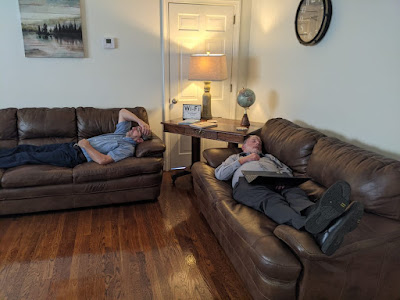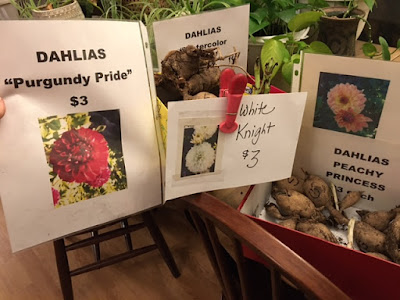 |
| Luci was at my house for a writers' dinner in 2013. She's in front, on the right. |
I had a friend in college, in maybe 1983, who felt that I simply couldn’t be a writer and effectively convey the human experience because my world as a Beachy-Amish woman was so narrow and my experience so limited.
When I tried to pin her down on particulars, her main point was that I never went out and got drunk. I thought that was kind of ridiculous, but I didn’t tell her so because I was Beachy-Amish and also I hadn’t had a chance to see if my writing appealed to anyone, Anabaptist or not.
Luci Miller Kinsinger grew up like me, only more so. She lived on a dairy farm in Wisconsin, similar in culture and climate to my rural Minnesota. I knew a few more of the world’s vices and profanities by the time I was in my 20s, since I’d attended public high school and community college, but both of us were Plain, sheltered, different. Curious, bookish, and word-hungry.
I knew for sure that my college friend was wrong when I
began writing for the Register-Guard in Eugene. Sometimes, the most simple, individual,
home-and-hearth musings touched a diverse readership. The personal, I found, is
universal.
Luci’s book, Turtle Heart, is simple. A young Mennonite woman forms a friendship with an older Ojibwe woman named Charlene. They are both changed in the process.
I have a feeling the theme of Turtle Heart is universal. I don’t know the effect it will have on others, but I know what it did for me. It shone a bright LED light into my own heart and memories and showed me exactly what was there. I kept thinking, “Yes! That’s exactly what it’s like! How does she do that?"
Luci crafts words and sentences and chapters like my friend Dana makes wedding cakes: carefully and deftly, layer by layer, turning simple shapes and ingredients into a well-planned work of art.
I marked the pages and passages I loved.
I think my favorite element of the story is the honesty. I feel like Luci searched until she found the right words to describe exactly the event, the emotion, the aged skin lifting from her friend as Luci removed a bandage, and the discoveries about herself, Charlene, and God.
I also love the changes in Luci’s view of the world, from an earnest young woman trying to “witness” to her friend, to a more mature woman who realizes that God reaches people’s hearts in His own ways.
Or maybe my favorite part is the pervasive sense of “otherness.” If someone wants to know what it’s like to be a Midwestern Amish or Mennonite girl venturing into the big world, hand them Turtle Heart.
Happily, this will be especially easy right now, because
Luci is offering a special on Turtle Heart.
I decided to do a Q & A with Luci about her writing process.
Q: I think every
writer who has struggled with structure notices it in other people's work.
Turtle Heart is so carefully crafted. Each chapter seems like its own piece of
quality furniture in a large room, or maybe a piece of wood in a house. You
balance another step in the outer story with your inner journey, memories,
dialogue, and so on. There is much you don't say. I'm interested in anything
you can tell me about how this came about, how much was intentional vs. it just
happened, etc.
A: That’s a hard question to answer. Probably like most writers, I write with a
combination of instinct and learned skill. When I first started Turtle Heart, I
took four huge sheets of butcher paper and plotted with circle-mapping how the
work would fit together. I used different colors to visually map different
themes and how they would weave through the book. I’ve kept the basic shape of
the first draft but rearranged multiple pieces of it since then. I’ve worked
through multiple revisions both on my own and with several different editors
and can credit the outside eyes along with the many revisions for helping me to
know what didn’t quite flow and helping to refine it.
Q: Can you tell me a bit about the process of writing the book? I know it's been
through several drafts and lots of time. How much did your diaries/journals
and/or class assignments become part of the book?
. A: During our friendship, I recorded many moments with Charlene or stories she told me or emotions she stirred up in me, sometimes as a vent and sometimes because I wanted to remember. When I started to write the story, I had so much I wanted to say but no idea how to begin. I ended up taking my conglomeration of pieces and stringing them together and then adding, whittling down, and refining from there.
Q: How much of the process was solitary and how much was influenced by others--family, college classes, critique groups, etc?
A: The heart of the book was forged in solitary places, but it
was refined and changed significantly by the input of beta readers and my
editors.
Q: It feels like each word of every chapter is carefully
selected and slotted into place. Do you naturally write that concisely, or do
you write more lavishly and then cut and slice and discard?
A: I write lavishly and then I discard. After so many edits, I had multiple
chances to cut out repetition and excess! I also read the book out loud through
almost every revision so I could hear the flow of words and make them sound
exactly right.
Q: What compelled/motivated you to write the story of your friendship with
Charlene?
A: We were so different. I could see the story in the contrast between us, and I wanted to write that story. I was also fascinated by Charlene. I think she is the most unique individual I’ve ever met, and I wanted to record some of that vitality and spirit.
Q: How has this compared with your first published book, Anything but Simple, in terms of the writing process and your perspective after it's sent out into the world?
A: I wrote Anything But Simple specifically for Herald Press, so I had a defined purpose, and writing it was relatively simple. It took me six months to write the first draft and another six to work with the editing team through to publication. I wrote Turtle Heart to satisfy the burning passion in me for this story, and I had no idea where to go with it when I’d finished. I started the rough draft in 2013 and finally published in 2021, with uncounted revisions and edits in between. I’ve felt much more fear after Turtle Heart’s publication because it feels like it came from such a vulnerable place inside me. It’s also less easily defined than Anything But Simple, so talking about it is more difficult.
Q: My daughter Emily and I both connected with your sense of otherness as a Mennonite woman venturing into the world and becoming learners and receivers after our clumsy attempts to share the Gospel. I'm curious what aspects of the story that other readers connect with most.
A: I’ve loved reading various reviews and hearing what stood out to different people. Almost everyone mentions something different.
Q: Your stepmother-in-law is my cousin Dorothy, and the family grapevine tells me you and your baby are a delight to your husband's family. How has being a wife and mom changed your thinking/writing process? You've said that your husband is your business manager. Every introverted writer should be so fortunate. Any insights/advice on making that work well?
A: I don’t know if I can define all the ways being a wife and mom has changed me. I know that now I’m a larger unit than just me. I still write openly and honestly, but there’s a bigger area of privacy in me than there used to be because I am protecting the intimacy of three people.
Ivan has been a tremendous support both in my writing and in encouraging me to finish my communications degree. Knowing that he genuinely cares if I meet my school and writing goals motivates me to keep working through long busy days or days I don’t feel like getting out of bed in the mornings. Sometimes when I write something that feels vulnerable, I ask him if he thinks it’s okay, and he says, “It sounds like you.” To him, that’s what matters. He’s also helped me in so many practical ways like looking for agent possibilities, deciding on a publisher, updating my website, mailing books, and making marketing decisions. Maybe “personal support person and life coach” would be a better title than business manager. 😊 Ivan is a businessman, but he’s never been in the book business before, so I feel like we’re both still learning how to make it work well. One of our goals since dating is teamwork, and that is what we try for.
Thank you, Luci, for sending me a copy of the book, and for answering my questions. You can get a copy of your own here, where it's 25% off today and tomorrow!
You can also get it on Amazon.
 |
| My copy of the book, already worn and stained from spilled coffee on an early-morning airport run. But a well-used book is a well-loved book, right? |




































